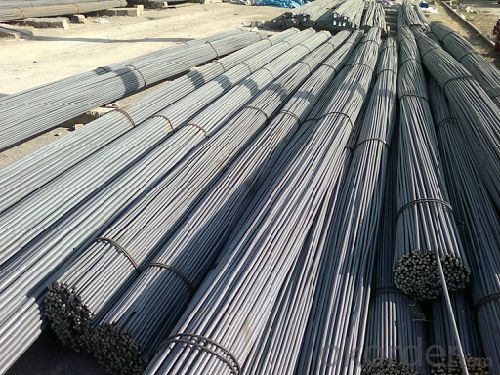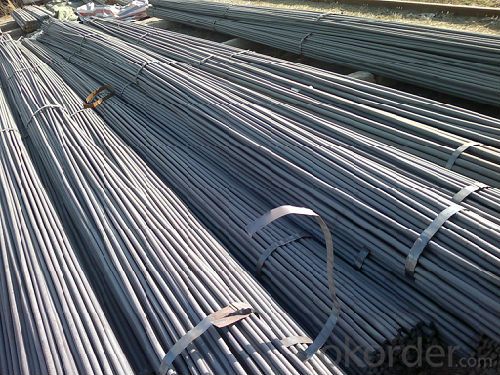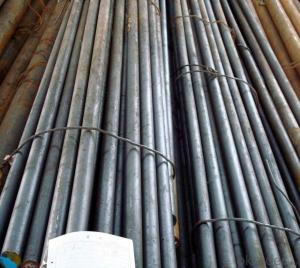High Quality Spring Steel Round Bar 8-10mm
- Loading Port:
- China main port
- Payment Terms:
- TT or LC
- Min Order Qty:
- 100 m.t
- Supply Capability:
- 10000 m.t/month
OKorder Service Pledge
OKorder Financial Service
You Might Also Like
High Quality Spring Steel Round Bar 8-10mm
Product Description:
Spring Steel can be divided into two types. One is carbon spring steel, and other one is alloy spring steel.
Alloy spring steel is based on carbon spring steel, by adding one or more alloying elements to improve the mechanical properties, hardenability and other properties to meet the requirement for manufacture all kinds of spring steel.
Specification of High Quality Spring Steel Round Bar 8-10mm:
-Material: 1065
-Standard: ASTM
-Production: Hot rolled or cold rolled
-Type: Spring Steel
| Diameter(mm) | Mass(kg/m) | Section(mm2) |
| 8 | 0.395 | 50.24 |
| 9 | 0.499 | 63.585 |
| 10 | 0.617 | 78.5 |
Corresponding Steel Grade of High Quality Spring Steel Round Bar 8-10mm for Reference:
USA, ASTM | CHN, GB/T | JPN, JIS | ISO |
1065 | 65 | SWRH67A SWRH67B | Type SC Type DC |
FRA, NF | GBR, BS | ||
C66D | C66D |
Chemical Composition of High Quality Spring Steel Round Bar 8-10mm:
C | Mn | Ni | Si |
0.62~0.70 | 0.50~0.80 | ≤0.30 | 0.17~0.37 |
P | S | Cr | Cu |
≤0.035 | ≤0.035 | ≤0.25 | ≤0.25 |
Mechanical Properties of High Quality Spring Steel Round Bar 8-10mm:
-Tensile Strength σb (MPa): ≥695
-Yield Strength σs (MPa): ≥410
-Elongation δ10(%): ≥10
-Percentage reduction of area: ψ (%): ≥30
-Hardness HBS, no heat treatment: ≤255
Usage/Applications of High Quality Spring Steel Round Bar 8-10mm:
-ASTM1065, is medium-high carbon spring steel. After heat treatment, this type of steel obtains high strength, hardness and elasticity but this material isn’t perfect for welding.
-Its fatigue strength is equal to alloy spring steel when they are in same configuration.
-For manufacturing spring, spring circle, all kinds of grommet, clutch, and axels in the production of normal machine.
Packaging & Delivery of High Quality Spring Steel Round Bar 8-10mm:
-Packing Detail: The products can be packed in bundles by steel wires.
-Marks: There are two types of marks. One is color mark and other one is tag mark. We paint color marks on both ends of bundles to make sure that it’s more convenient for customers to distinguish their products from other products at the destination port. The tag marks will be tied up to each bundle to make sure that customers know the specifications of each bundle like product’s name and size and other information of products.
-Delivery Detail:
1, Delivery time: 30~60 working days after receive buyer’s T.T. or L/C.
2, Delivery status should be written in the contract. (Heat treatment or no)
FAQ:
Q1: Why buy Materials & Equipment from OKorder.com?
A1: All products offered byOKorder.com are carefully selected from China's most reliable manufacturing enterprises. Through its ISO certifications, OKorder.com adheres to the highest standards and a commitment to supply chain safety and customer satisfaction.
Q2: How do we guarantee the quality of our products?
A2: We have established an advanced quality management system which conducts strict quality tests at every step, from raw materials to the final product. At the same time, we provide extensive follow-up service assurances as required.
Q3: How soon can we receive the product after purchase?
A3: Within three days of placing an order, we will arrange production. The shipping date is dependent upon the quatity, how many sizes you want and the plan of production, but is typically 1 month to 2 month days from the beginning of production.
Images of High Quality Spring Steel Round Bar 8-10mm:


*If you would like to get our price, please inform us the size, standard/material and quantity. Thank you very much for your attention.
- Q:What are the applications of special steel in the medical field?
- The medical field benefits greatly from the unique properties and characteristics of special steel, which has a wide range of applications. Surgical instruments are one major area where special steel, such as stainless steel, is extensively used. These instruments, including scalpels, forceps, scissors, and surgical needles, require strength, durability, and resistance to corrosion. Special steel provides the necessary qualities to ensure these instruments maintain their sharpness and integrity even after repeated use and sterilization. Another important application of special steel in healthcare is the production of implants and prosthetics. Various special steel alloys, such as titanium alloys, cobalt-chromium alloys, and nickel-titanium alloys, are commonly employed to manufacture orthopedic and dental implants, as well as other medical devices. These alloys possess excellent biocompatibility, corrosion resistance, and mechanical strength, which make them ideal for long-term implantation within the human body. Special steel also plays a crucial role in the construction of medical equipment and machinery. Diagnostic machines like MRI scanners and X-ray machines often incorporate special steel components due to their magnetic properties and ability to withstand high temperatures. By utilizing special steel, the accuracy, reliability, and safety of these devices are ensured. Furthermore, special steel is used in the manufacturing of medical storage and transportation systems. Steel cabinets, trolleys, and containers are commonly used to store and transport medical supplies, instruments, and samples. The use of special steel in these systems guarantees durability, hygiene, and a long lifespan. Special steel is easy to clean, resistant to contamination, and maintains its quality over time. In conclusion, special steel is extensively utilized in the medical field for a variety of purposes. From surgical instruments to implants, medical equipment to storage systems, special steel is an essential material that contributes to the effectiveness, reliability, and safety of medical procedures and treatments. Its unique properties make it an indispensable resource in the healthcare industry.
- Q:What are the different corrosion-resistant grades of special steel?
- There are several corrosion-resistant grades of special steel that are commonly used in various industries. These grades are specifically designed to resist corrosion and maintain their structural integrity in harsh environments. Some of the different corrosion-resistant grades of special steel are: 1. Stainless Steel: Stainless steel is one of the most popular corrosion-resistant grades and is widely used in various applications. It contains a minimum of 10.5% chromium, which forms a protective passive oxide layer on the surface, preventing corrosion. There are different types of stainless steel, such as austenitic, ferritic, and martensitic, each with varying levels of corrosion resistance. 2. Duplex Stainless Steel: Duplex stainless steel is a combination of austenitic and ferritic stainless steels, offering superior corrosion resistance compared to conventional stainless steel grades. It has a high chromium content, along with other alloying elements like molybdenum and nitrogen, which enhance its resistance to pitting, crevice corrosion, and stress corrosion cracking. 3. Super Duplex Stainless Steel: Super duplex stainless steel is an even higher corrosion-resistant grade than duplex stainless steel. It has a higher chromium and molybdenum content, providing excellent resistance to highly corrosive environments, such as seawater, chemicals, and acids. Super duplex stainless steel is commonly used in offshore oil and gas industries. 4. Nickel Alloys: Nickel alloys, such as Inconel and Hastelloy, are highly corrosion-resistant grades of special steel. These alloys have a high nickel content, along with other elements like chromium and molybdenum, which make them resistant to a wide range of corrosive environments, including high-temperature and acidic conditions. 5. Titanium Alloys: Titanium alloys are known for their exceptional corrosion resistance, especially in aggressive media, such as seawater and chemical processing environments. These alloys have a low density, high strength, and superior resistance to pitting, crevice corrosion, and stress corrosion cracking. 6. Aluminum Alloys: Certain aluminum alloys, such as 5052 and 6061, are also corrosion-resistant grades of special steel. These alloys have a protective oxide layer that forms on the surface, providing excellent resistance to atmospheric corrosion. Aluminum alloys are commonly used in marine and aerospace applications. These are just a few examples of the different corrosion-resistant grades of special steel. The selection of the appropriate grade depends on the specific corrosive environment, temperature, mechanical properties required, and other factors related to the intended application.
- Q:Can special steel be used for luxury goods?
- Yes, special steel can be used for luxury goods. Special steel often possesses superior qualities such as durability, strength, and resistance to corrosion, making it an ideal material for high-end products like luxury watches, jewelry, and accessories. Additionally, the uniqueness and exclusivity associated with special steel can enhance the appeal and desirability of luxury goods.
- Q:How does special steel contribute to the oil and gas aftermarket industry?
- Special steel plays a crucial role in the oil and gas aftermarket industry due to its unique properties and capabilities. Firstly, special steel is highly resistant to corrosion, making it ideal for use in the harsh and corrosive environments commonly found in the oil and gas sector. This resistance to corrosion ensures that the equipment and components made from special steel have a longer lifespan, reducing the need for frequent replacements and maintenance. Additionally, special steel offers high strength and durability, allowing it to withstand the extreme pressures and temperatures encountered in oil and gas operations. This strength ensures that the equipment and components made from special steel can operate reliably and efficiently, even under demanding conditions. Moreover, special steel can be tailored to meet the specific needs of the oil and gas industry. With its various grades and compositions, special steel can be customized to possess specific properties such as resistance to sulfide stress cracking, hydrogen embrittlement, and high-temperature oxidation. These customized properties make special steel suitable for critical applications such as wellheads, pipelines, valves, and other equipment used in the oil and gas aftermarket industry. Furthermore, special steel enables the production of complex and intricate components that are essential for the oil and gas sector. Its excellent machinability and weldability allow for the creation of precision-engineered parts, ensuring the efficient and reliable operation of oil and gas equipment. In summary, special steel contributes significantly to the oil and gas aftermarket industry by providing corrosion resistance, high strength, durability, customization options, and the ability to manufacture intricate components. These properties make special steel indispensable in ensuring the safety, reliability, and efficiency of operations in the oil and gas sector.
- Q:How does special steel perform in high-temperature mechanical fatigue conditions?
- Special steel, known for its high strength and resistance to heat, performs exceptionally well in high-temperature mechanical fatigue conditions. Its unique composition and properties enable it to withstand prolonged exposure to elevated temperatures without significant loss of mechanical integrity or performance. This makes special steel a reliable and durable material choice for applications that involve repetitive cyclic loading and heat exposure, such as in aerospace, power generation, and automotive industries.
- Q:Can special steel be used for making springs?
- Indeed, springs can be crafted using special steel. Recognized as alloy steel, special steel possesses augmented mechanical attributes like impressive tensile strength, toughness, and resistance against corrosion. Consequently, it serves as an optimal substance for the production of robust and dependable springs across diverse applications. The precise variant of special steel employed in spring production hinges upon the particular necessities of the application, be it a desired degree of flexibility or resistance against fatigue. All in all, special steel bestows extraordinary performance and endurance in the realm of spring manufacturing.
- Q:What are the environmental impacts of special steel production?
- The environmental impacts of special steel production include emissions of greenhouse gases, such as carbon dioxide and methane, which contribute to climate change. The process also generates air pollutants, including particulate matter and sulfur dioxide, which can harm human health and contribute to air pollution. Additionally, the extraction of raw materials for special steel production can lead to habitat destruction and biodiversity loss. Proper management and adoption of more sustainable practices, such as energy efficiency and waste reduction, can help mitigate these impacts.
- Q:Can special steel be used in the pharmaceutical manufacturing industry?
- Yes, special steel can be used in the pharmaceutical manufacturing industry. Special steel, such as stainless steel, offers excellent corrosion resistance, durability, and cleanability, making it suitable for various applications in pharmaceutical manufacturing, including equipment and machinery used in production, storage, and transportation of pharmaceutical products. Special steel's properties ensure compliance with strict hygiene and quality standards in the industry.
- Q:What are the applications of special steel in the power generation supply chain?
- Special steel has various applications in the power generation supply chain, primarily due to its high strength, corrosion resistance, and ability to withstand extreme temperatures. It is commonly used in the construction of power plant components such as turbines, boilers, and heat exchangers. Special steel is also utilized in the manufacturing of transmission towers, electrical transformers, and generator rotor shafts. Overall, its superior properties enhance the efficiency, reliability, and longevity of power generation equipment, ensuring a stable and uninterrupted energy supply.
- Q:How does special steel contribute to the manufacturing aftermarket industry?
- The manufacturing aftermarket industry greatly relies on special steel to enhance the performance, durability, and reliability of components and equipment. Special steel is particularly valuable because it can withstand extreme conditions like high temperatures, corrosive environments, and heavy loads. This makes it an ideal choice for producing critical parts in industries such as automotive, aerospace, energy, and machinery. In the manufacturing aftermarket industry, special steel is commonly used to create replacement parts for machinery or equipment that have deteriorated or been damaged over time. By using special steel, these replacement parts can meet the specifications set by the original equipment manufacturer (OEM) in terms of strength and resilience. Moreover, special steel enables the development of innovative designs and the production of lightweight and efficient components. This leads to improved equipment performance, reduced energy consumption, and increased productivity. For instance, in the automotive industry, special steel is used to make lightweight engine components, resulting in better fuel efficiency and lower emissions. Furthermore, the use of special steel in the manufacturing aftermarket industry helps to reduce maintenance and downtime costs. By using high-quality steel, the longevity of replacement parts is increased, reducing the need for frequent repairs or replacements. Consequently, this decreases production downtime and associated expenses while enhancing overall equipment reliability. Additionally, special steel offers a wide range of customization possibilities, allowing manufacturers to tailor the material properties to meet specific requirements. This flexibility enables the development of unique solutions and the production of specialized components that meet the demands of different industries. It also enables manufacturers to address specific challenges related to wear resistance, hardness, or toughness, which are crucial factors in the aftermarket industry. In conclusion, special steel plays a crucial role in the manufacturing aftermarket industry by enhancing the performance, durability, and reliability of replacement parts. Its ability to withstand extreme conditions, enable innovative designs, reduce maintenance costs, and offer customization options make it an indispensable material in the production of components and equipment across various industries.
1. Manufacturer Overview |
|
|---|---|
| Location | |
| Year Established | |
| Annual Output Value | |
| Main Markets | |
| Company Certifications | |
2. Manufacturer Certificates |
|
|---|---|
| a) Certification Name | |
| Range | |
| Reference | |
| Validity Period | |
3. Manufacturer Capability |
|
|---|---|
| a)Trade Capacity | |
| Nearest Port | |
| Export Percentage | |
| No.of Employees in Trade Department | |
| Language Spoken: | |
| b)Factory Information | |
| Factory Size: | |
| No. of Production Lines | |
| Contract Manufacturing | |
| Product Price Range | |
Send your message to us
High Quality Spring Steel Round Bar 8-10mm
- Loading Port:
- China main port
- Payment Terms:
- TT or LC
- Min Order Qty:
- 100 m.t
- Supply Capability:
- 10000 m.t/month
OKorder Service Pledge
OKorder Financial Service
Similar products
New products
Hot products
Related keywords





























